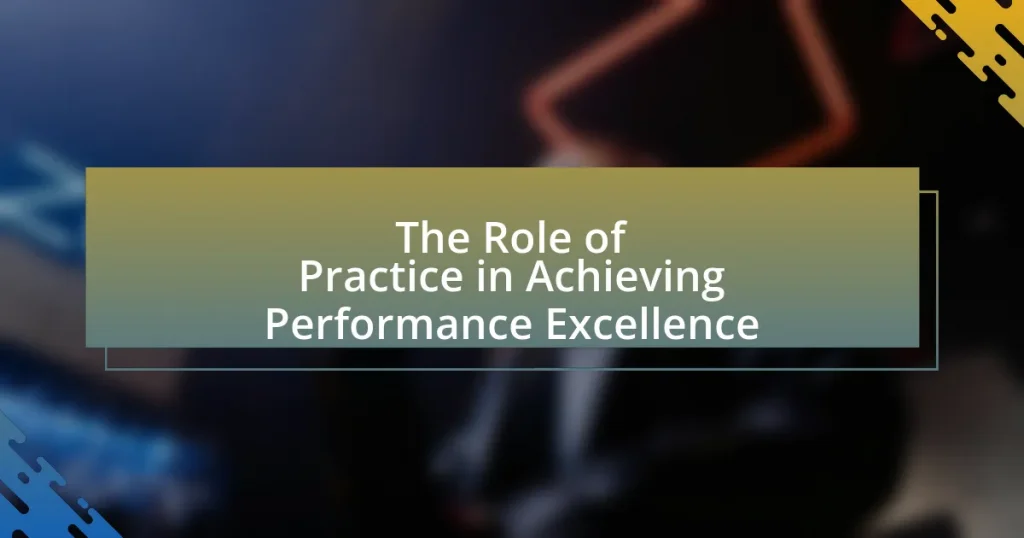The main entity of the article is the role of practice in achieving performance excellence. The article outlines how consistent and deliberate practice is crucial for skill development, proficiency, and mastery across various fields, supported by research indicating that approximately 10,000 hours of focused practice is necessary for expertise. Key elements of effective practice, such as goal setting, feedback, repetition, and reflection, are discussed, along with the differences between deliberate and regular practice. Additionally, the psychological aspects of practice, including motivation and mindset, are explored, highlighting their impact on performance improvement. The article also examines practical applications of practice in sports, education, healthcare, and business, emphasizing its significance in professional development and continuous learning.

What is the Role of Practice in Achieving Performance Excellence?
Practice is essential for achieving performance excellence as it facilitates skill development, enhances proficiency, and fosters mastery in a given field. Through consistent and deliberate practice, individuals can refine their techniques, improve their decision-making abilities, and increase their overall effectiveness. Research by Ericsson et al. (1993) highlights that expert performance is largely a result of extensive practice, with the “10,000-hour rule” suggesting that approximately 10,000 hours of focused practice is necessary to achieve expertise in complex domains. This evidence underscores the critical role of practice in not only developing skills but also in maintaining high levels of performance over time.
How does practice contribute to performance improvement?
Practice enhances performance improvement by facilitating skill acquisition and refinement through repetition and feedback. Engaging in consistent practice allows individuals to develop muscle memory, improve cognitive processing, and increase confidence in their abilities. Research indicates that deliberate practice, characterized by focused and goal-oriented efforts, leads to significant gains in performance across various domains, including sports and music. A study by Ericsson et al. (1993) demonstrated that expert performers typically engage in over 10,000 hours of deliberate practice, underscoring the correlation between extensive practice and high-level performance.
What are the key elements of effective practice?
The key elements of effective practice include goal setting, feedback, repetition, and reflection. Goal setting provides a clear target for improvement, which enhances focus and motivation. Feedback, whether from self-assessment or external sources, allows individuals to understand their performance and make necessary adjustments. Repetition is crucial for skill acquisition, as it reinforces learning and builds muscle memory. Reflection enables practitioners to evaluate their experiences, identify strengths and weaknesses, and develop strategies for future improvement. Research by Ericsson et al. (1993) in “The Role of Deliberate Practice in the Acquisition of Expert Performance” highlights that these elements are essential for achieving high levels of performance in any field.
How does deliberate practice differ from regular practice?
Deliberate practice differs from regular practice in that it is specifically designed to improve performance through focused, goal-oriented activities that push an individual’s limits. Regular practice often involves repetition of tasks without a structured approach to skill enhancement, while deliberate practice requires feedback, self-reflection, and the setting of specific objectives to foster improvement. Research by Ericsson et al. (1993) highlights that deliberate practice is essential for achieving expert-level performance, as it emphasizes the importance of challenging oneself beyond current capabilities, unlike regular practice which may reinforce existing skills without significant advancement.
Why is consistency important in practice?
Consistency is important in practice because it leads to mastery and improved performance over time. Regular and repeated engagement in a specific activity allows individuals to refine their skills, build muscle memory, and develop a deeper understanding of the task. Research indicates that consistent practice can enhance performance by up to 20% in various fields, such as sports and music, as evidenced by studies conducted by Ericsson et al. (1993) in “The Role of Deliberate Practice in the Acquisition of Expert Performance.” This demonstrates that without consistency, the potential for skill development and excellence is significantly diminished.
How does regular practice lead to skill mastery?
Regular practice leads to skill mastery by reinforcing neural pathways and enhancing muscle memory. This consistent engagement allows individuals to refine techniques, improve accuracy, and increase efficiency in their performance. Research indicates that the “10,000-hour rule,” popularized by Malcolm Gladwell, suggests that extensive practice is essential for achieving expert-level proficiency in any field, supported by studies showing that deliberate practice significantly correlates with skill improvement.
What role does feedback play in consistent practice?
Feedback is essential in consistent practice as it provides individuals with specific information about their performance, enabling them to make necessary adjustments. This process of receiving and integrating feedback fosters improvement and skill development, which are critical for achieving excellence. Research indicates that feedback can enhance learning outcomes by up to 30%, as it helps practitioners identify strengths and weaknesses, thereby guiding their practice effectively.

What are the psychological aspects of practice in performance excellence?
The psychological aspects of practice in performance excellence include motivation, focus, resilience, and mental imagery. Motivation drives individuals to engage in consistent practice, which is essential for skill development; studies show that intrinsic motivation leads to higher levels of engagement and persistence (Deci & Ryan, 2000). Focus enables practitioners to concentrate on specific tasks, enhancing performance; research indicates that athletes who maintain focus during practice sessions demonstrate improved outcomes (Weinberg & Gould, 2014). Resilience allows individuals to overcome setbacks and maintain a positive attitude, which is crucial for long-term success; evidence suggests that resilient athletes are more likely to achieve their goals (Gould et al., 2002). Lastly, mental imagery helps practitioners visualize success and rehearse skills mentally, contributing to improved performance; studies have found that athletes who use mental imagery effectively can enhance their actual performance (Cumming & Hall, 2002). These psychological factors collectively influence the effectiveness of practice in achieving performance excellence.
How does mindset influence practice effectiveness?
Mindset significantly influences practice effectiveness by shaping an individual’s approach to learning and skill development. A growth mindset, characterized by the belief that abilities can be developed through dedication and hard work, leads to greater resilience and persistence during practice sessions. Research by Carol Dweck demonstrates that individuals with a growth mindset are more likely to embrace challenges, learn from feedback, and ultimately achieve higher levels of performance. Conversely, a fixed mindset, which assumes that abilities are static, can hinder progress and reduce the effectiveness of practice by fostering fear of failure and avoidance of challenging tasks. Thus, the type of mindset directly impacts how effectively one practices and improves in their chosen field.
What is the impact of a growth mindset on performance?
A growth mindset positively impacts performance by fostering resilience, adaptability, and a willingness to learn from failures. Individuals with a growth mindset view challenges as opportunities for development, which enhances their motivation and persistence in the face of obstacles. Research by Carol Dweck, a leading psychologist in this field, demonstrates that students with a growth mindset achieve higher academic performance compared to those with a fixed mindset, as they are more likely to engage in effective learning strategies and seek feedback. This mindset encourages continuous improvement, ultimately leading to superior performance outcomes in various domains.
How can visualization techniques enhance practice outcomes?
Visualization techniques can enhance practice outcomes by improving focus, increasing motivation, and facilitating skill acquisition. Research indicates that mental imagery activates similar neural pathways as physical practice, leading to enhanced performance. A study by Dr. Richard Wiseman published in the Journal of Applied Psychology found that athletes who used visualization techniques improved their performance by up to 20%. This demonstrates that incorporating visualization into practice routines can significantly boost effectiveness and lead to superior results in achieving performance excellence.
Why is motivation crucial for sustained practice?
Motivation is crucial for sustained practice because it drives individuals to consistently engage in activities necessary for skill development and improvement. Without motivation, the likelihood of abandoning practice increases, as individuals may not see the value or benefit in continuing their efforts. Research indicates that motivated individuals are more likely to set goals, persist through challenges, and ultimately achieve higher levels of performance. For instance, a study published in the Journal of Applied Psychology found that intrinsic motivation significantly correlates with sustained effort and performance outcomes in various fields. This evidence underscores the importance of motivation as a foundational element in the journey toward performance excellence.
What strategies can enhance motivation during practice?
To enhance motivation during practice, setting specific, achievable goals is crucial. Research indicates that goal-setting increases motivation by providing clear targets and a sense of accomplishment when those targets are met. For instance, a study by Locke and Latham (2002) found that individuals who set specific goals performed better than those who set vague or no goals, demonstrating the effectiveness of this strategy. Additionally, incorporating regular feedback can further boost motivation, as it allows individuals to track their progress and make necessary adjustments, reinforcing their commitment to improvement.
How do intrinsic and extrinsic motivations differ in practice contexts?
Intrinsic motivation refers to engaging in an activity for its inherent satisfaction, while extrinsic motivation involves performing an activity to achieve external rewards or avoid negative outcomes. In practice contexts, intrinsic motivation often leads to deeper engagement and persistence, as individuals find joy and fulfillment in the activity itself, which can enhance skill development and performance. For example, athletes who train because they love their sport are likely to practice more consistently and with greater intensity than those who train solely for trophies or recognition. Research by Deci and Ryan (2000) in their Self-Determination Theory highlights that intrinsic motivation fosters creativity and problem-solving, which are crucial for achieving performance excellence. Conversely, extrinsic motivation can be effective in driving short-term results but may diminish intrinsic interest over time, as shown in studies indicating that reliance on rewards can undermine intrinsic motivation (Lepper et al., 1973). Thus, while both motivations can influence practice, intrinsic motivation is generally more beneficial for long-term skill acquisition and performance excellence.

What are the practical applications of practice in various fields?
Practice has practical applications across various fields, enhancing skills and performance. In sports, athletes engage in repetitive drills to improve techniques and physical conditioning, leading to better competition outcomes. In education, students practice problem-solving and critical thinking through exercises, which boosts academic performance and retention of knowledge. In healthcare, medical professionals practice procedures in simulations to refine their skills and reduce errors in real-life situations. In business, employees participate in role-playing exercises to develop negotiation and communication skills, which can lead to improved sales and customer relations. These applications demonstrate that consistent practice is essential for achieving excellence in diverse domains.
How is practice utilized in sports for performance excellence?
Practice is utilized in sports for performance excellence by systematically enhancing athletes’ skills, techniques, and mental resilience. Through repetitive drills and structured training sessions, athletes refine their abilities, leading to improved performance during competitions. Research indicates that deliberate practice, characterized by focused and goal-oriented training, significantly contributes to skill acquisition and mastery, as evidenced by studies showing that elite athletes engage in over 10,000 hours of practice to reach their peak performance levels. This structured approach not only develops physical capabilities but also fosters strategic thinking and adaptability, essential for success in competitive environments.
What specific training methods are most effective in sports practice?
The most effective training methods in sports practice include periodization, specific skill drills, and simulation training. Periodization involves systematically varying training intensity and volume to optimize performance and recovery, which has been shown to enhance athletic performance over time. Specific skill drills focus on the precise techniques required for a sport, allowing athletes to refine their skills through repetition and feedback. Simulation training replicates competitive conditions, enabling athletes to practice decision-making and execution under pressure, which is crucial for performance in actual competitions. Research indicates that these methods lead to improved outcomes in various sports, as evidenced by studies demonstrating enhanced performance metrics in athletes who engage in structured training regimens.
How do athletes measure progress in their practice routines?
Athletes measure progress in their practice routines through various metrics such as performance statistics, skill assessments, and feedback from coaches. Performance statistics include quantifiable data like times, scores, or distances that indicate improvement over time. Skill assessments involve evaluating specific techniques or abilities, often through drills or competitions, to identify areas of strength and weakness. Feedback from coaches provides qualitative insights that help athletes understand their development and areas needing focus. These methods collectively enable athletes to track their advancement and make informed adjustments to their training regimens.
What role does practice play in professional development?
Practice is essential in professional development as it enhances skills, knowledge, and overall performance. Engaging in deliberate practice allows individuals to refine their abilities, adapt to new challenges, and achieve mastery in their respective fields. Research indicates that consistent practice leads to improved outcomes; for instance, a study by Ericsson et al. (1993) demonstrated that expert performers in various domains, such as music and sports, dedicated thousands of hours to practice, significantly contributing to their success. This evidence underscores the critical role of practice in fostering continuous growth and excellence in professional settings.
How can professionals implement practice in their skill development?
Professionals can implement practice in their skill development by engaging in deliberate practice, which involves focused, goal-oriented activities designed to improve performance. This method emphasizes the importance of setting specific objectives, receiving feedback, and consistently challenging oneself to push beyond current capabilities. Research by Ericsson et al. (1993) highlights that deliberate practice is essential for achieving expertise, as it allows individuals to refine their skills through repetition and targeted improvement. By incorporating structured practice sessions into their routines, professionals can systematically enhance their competencies and achieve higher levels of performance excellence.
What are the best practices for continuous learning in the workplace?
The best practices for continuous learning in the workplace include fostering a culture of feedback, providing access to training resources, encouraging peer learning, and setting clear learning objectives. Fostering a culture of feedback allows employees to receive constructive criticism and improve their skills, which is essential for growth. Providing access to training resources, such as online courses and workshops, enables employees to learn at their own pace and stay updated with industry trends. Encouraging peer learning through mentorship programs or collaborative projects enhances knowledge sharing and builds team cohesion. Setting clear learning objectives helps employees focus on specific skills and track their progress, ensuring that learning is aligned with organizational goals. These practices are supported by research indicating that organizations with strong learning cultures experience higher employee engagement and retention rates.
What are some tips for effective practice to achieve performance excellence?
Effective practice to achieve performance excellence involves setting specific goals, maintaining consistent routines, and seeking feedback. Research indicates that goal-setting enhances motivation and focus, leading to improved performance outcomes. Consistency in practice allows for skill reinforcement and mastery, as demonstrated by studies showing that deliberate practice over time significantly correlates with expertise in various fields. Additionally, obtaining constructive feedback helps identify areas for improvement, facilitating targeted adjustments that enhance overall performance.















